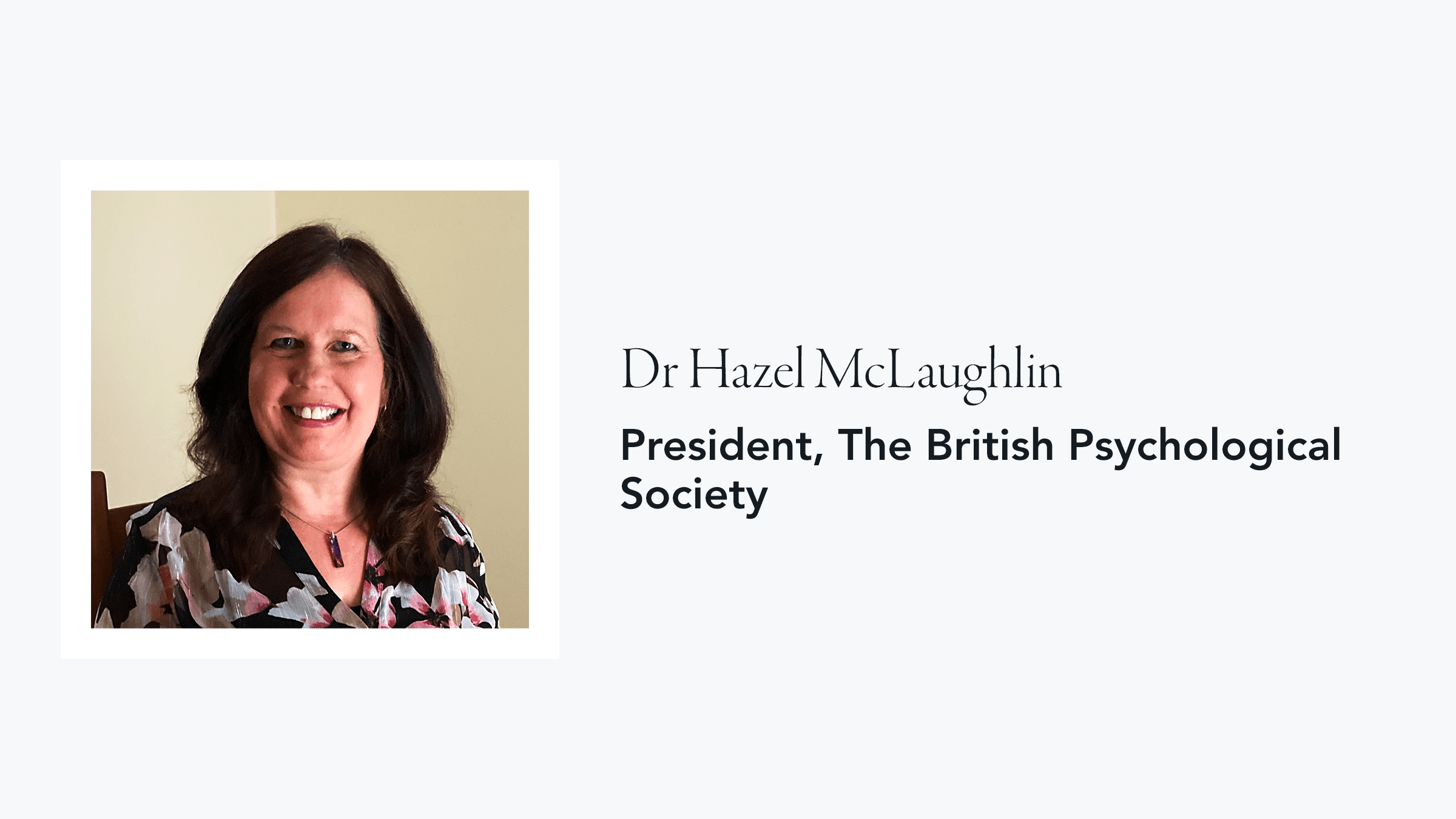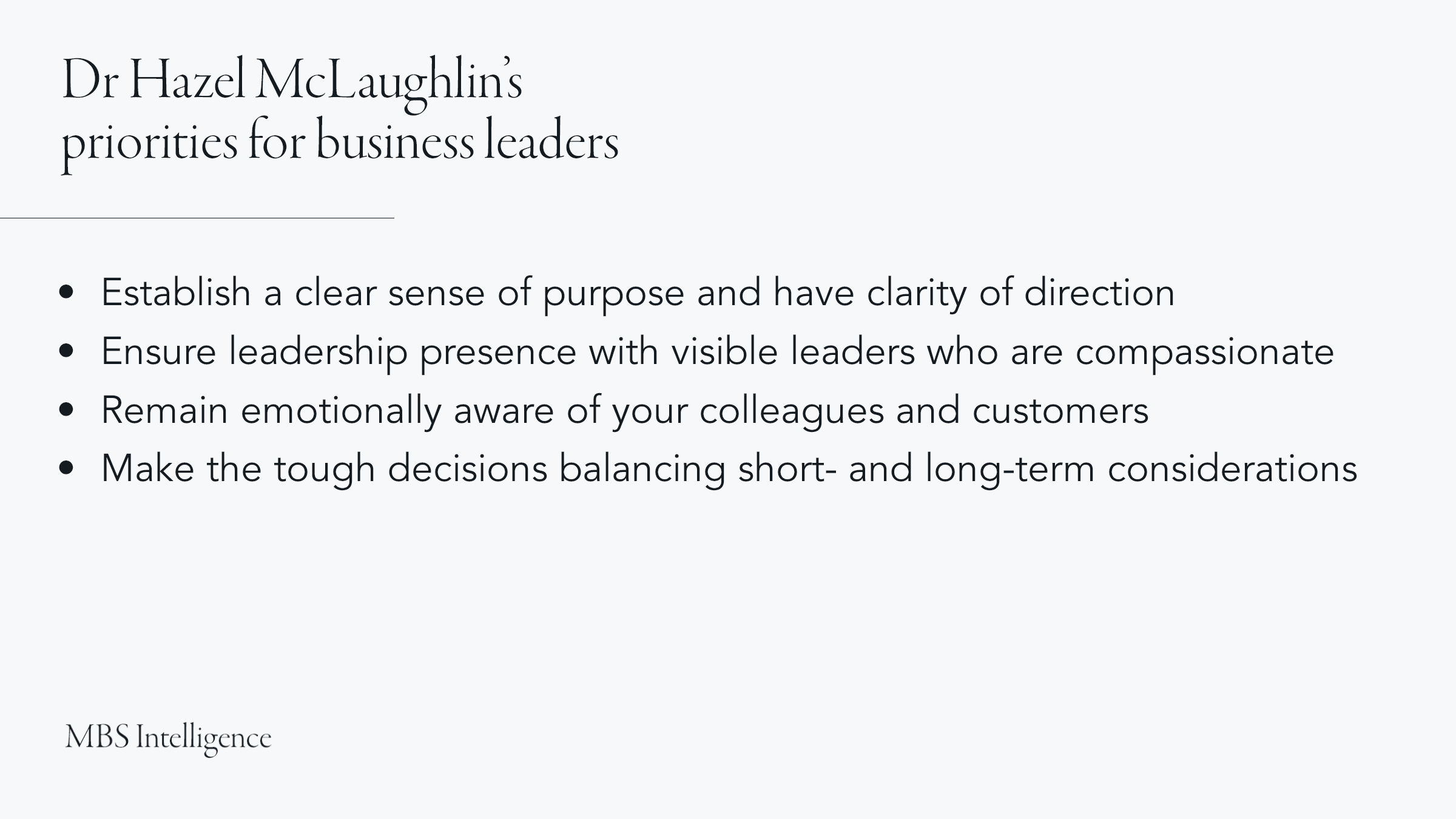It’s been 21 weeks since the UK went into lockdown, and fatigue has started to set in among many leaders. At this time, the need for both personal and corporate resilience is greater than ever. One person who understands this better than most is Dr. Hazel McLaughlin, the new President of the British Psychological Society. She is determined to use the scientific underpinnings of psychology to address the countless issues being presented by Covid-19.
Wanting to hear more about how leaders can harness psychology to build resilient businesses, I caught up with Hazel earlier this week. Our conversation was incredibly timely, covering everything from how to cope with fatigue to the best ways to objectively assess potential hires when rebuilding organisations.
Especially in our sectors, where companies have been disproportionately impacted by the effects of the pandemic, business leaders have had to cope with never-before-seen workloads, juggling short-term matters of survival and employee wellbeing with long-term considerations about the future of their organisations. In short, as Hazel observes, stress levels are understandably high: “Leaders are dealing with immense pressure to deliver in very uncertain times. Above all, there’s a pressure to find the right answers when in reality, there are no right answers – it is just about how you make the best decisions for your business and how you construct agile responses to the situation.”
Hazel agrees that this is particularly pertinent in the consumer-facing sector, where leaders are generally robust, used to being responsive, acting fast and coping with difficult situations. “But even the best leaders have to recognise that we are still in an unprecedented situation,” Hazel said, “and that stepping back and taking some time out will lead to better business decisions.”
“But even the best leaders have to recognise that we are still in an unprecedented situation, and that stepping back and taking some time out will lead to better business decisions.”
Throughout my conversations with leaders over the last few months, it has become clear that employee mental health is a central priority. I asked Hazel for the advice she would give to senior executives looking to focus on the wellbeing of colleagues during this time.
“Again, it’s about recognising the enormity of the situation,” she said, “and acknowledging that not everyone has the same levels of personal resilience. Leaders must start by appreciating that stress is a normal part of operating during Covid-19, and setting the tone of embracing the ‘good’ stress that leads to productivity while actively working to avoid the ‘bad’ stress that leads to burnout.”
Flexibility, Hazel suggested, will be a key part of looking out for employees during this time, and businesses must be sure to integrate a level of flexibility into their ongoing people strategies. “Leaders must be mindful of personal circumstances,” she explained. “It’s easy to assume that everyone’s situation is just like yours, and overlook the fact that members of your team might be caring for elderly relatives, have complicated childcare situations or their own personal difficulties related to the pandemic. Showing your team that you can offer leeway is vital.”
“Showing your team that you can offer leeway is vital.”
But while working from home provides a level of freedom and flexibility, not everyone responds well to being away from an office environment, and constant and consistent communication channels are needed to work against employees feeling isolated or stressed.
“The need to communicate has increased,” Hazel confirmed, “both from a development perspective and an employee wellbeing standpoint.” Hazel and I discussed this at length, exploring how swapping the office for our kitchen tables has largely meant the end of informal mentoring – particularly for more junior colleagues. It is certainly more difficult to give ongoing advice, or provide consistent feedback, when working remotely – and employees are likely to miss out on the learning opportunities that come from simply ‘listening in’ on conversations happening around them. To counter this, Hazel suggested that business leaders establish more formal mentoring and coaching processes during Covid-19. “Knowing your team and integrating them into the organisation is also critical,” she explained, “and on-boarding services can support this transition.”
Our conversation then moved on to how CEOs can minimise stress levels of those around them. “CEOs should consider using psychometric tools to allow their team to reflect on their underlying resilience and the things that make them tick,” Hazel offered. “At times of stress it’s very easy to focus on what you’re not doing well. I’ve seen countless people setting impossibly high standards for themselves during this period, so enabling people to focus on what they’re good at – and how they can build on those skills – is really key.”
Lastly, as consumer businesses resize and restructure to prepare for the next phases of the crisis, I wondered what role Hazel thought an understanding of psychology, and executive assessment specifically, will have in helping businesses create the right teams going forward.
“Now more than ever it is paramount that you have the right people for the job,” Hazel told me, “and objective assessment has a central part to play. Success in a role often isn’t about technical ability: it’s about emotional intelligence, making informed decisions at pace and leveraging the capabilities of those around you. Moreover, psychometric tools can be used to foster a team that brings diverse capabilities to the table. Integrating these tools into hiring processes can ensure that the right mix of skillsets, personalities and working styles are present in your team.”
As our conversation drew to a close, I asked Hazel what advice she would give to leaders for the next phases of Covid-19. “Be bold,” she said. “It’s not just about being robust – it’s about being creative to ensure a competitive edge. There also needs to be much more customer centricity: customers have changed – we’ve all changed – and things won’t go back to the way they were before.”
“It’s not just about being robust – it’s about being creative to ensure a competitive edge. There also needs to be much more customer centricity: customers have changed – we’ve all changed – and things won’t go back to the way they were before.”
With this in mind, Hazel spoke on the importance of understanding the science of psychology and of looking at data, evidence and facts in order to inform decisions, know your customers and understand your colleagues. “I’m delighted to see psychology being taken seriously today,” she told me, “and to see business leaders using psychology – and other scientific disciplines – to guide policy.” In these most extraordinary times, with no rulebooks or roadmaps to follow, business leaders should utilise every tool at their disposal – and embracing psychology to underpin decision making is an excellent place to start.
In the meantime, for those of you on holiday or about to go on holiday over the summer, I hope you are able to take the time to relax, recuperate and recharge your batteries!
Dr Hazel McLaughlin is President of the British Psychological Society, founder of MorphSmart, and an advisor to The MBS Group on executive assessment.
Elliott.goldstein@thembsgroup.co.uk | @TheMBSGroup | hazel.mclaughlin@morphsmart.com










